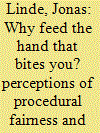| Srl | Item |
| 1 |
ID:
181645


|
|
|
|
|
| Summary/Abstract |
This study explores the differences in system support between the ethnic majority and ethnic minority populations in Turkey and Israel, taking into account three specific dimensions of system support: national identity, evaluation of democracy, and institutional trust. A comparison of the gaps in these dimensions is conducted using surveys. The findings show that, in both countries, the majority tends to show higher levels of system support than the minority. Among the Turkish Kurdish minority, lower levels of system support can be found across all the dimensions examined, while among the Palestinian citizens of Israel minority, the gaps are bigger in the cultural aspect of national identity but much smaller in the evaluation of democracy and institutional trust. These findings are discussed in light of both the differences between the two regimes and their dissimilar strategies for addressing ethno-national divisions and the theoretical implications of examining the multidimensionality of system support.
|
|
|
|
|
|
|
|
|
|
|
|
|
|
|
|
| 2 |
ID:
111908


|
|
|
|
|
| Publication |
2012.
|
| Summary/Abstract |
There is widespread agreement that bad governance and corruption represent daunting threats to new democracies and developing countries. Nonetheless, mainstream research on system support and political legitimacy has to a large extent overlooked the crucial importance of public perceptions of procedural fairness for fostering public support and regime legitimacy. Taking its departure in the theory of procedural fairness, this article challenges the conventional wisdom of earlier research by arguing and demonstrating that public perceptions of procedural fairness and impartiality on behalf of the authorities are the most important determinants of system support in the post-communist European Union Member States. The empirical analysis lends strong support to the fact that perceptions of fairness and the extent of corruption exercise a strong effect on public support for the performance of the political system and approval of regime principles.
|
|
|
|
|
|
|
|
|
|
|
|
|
|
|
|